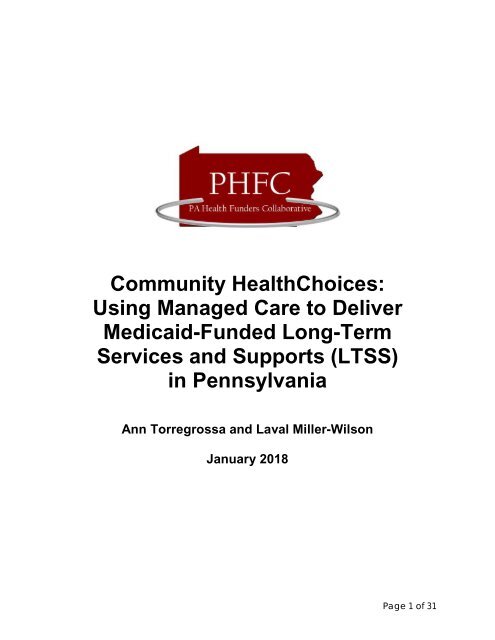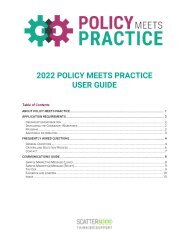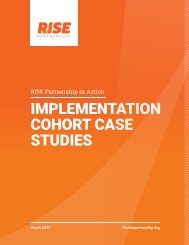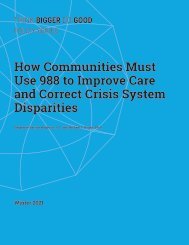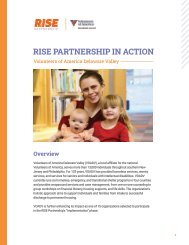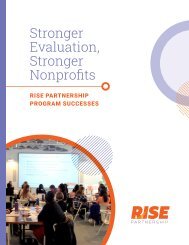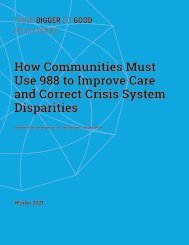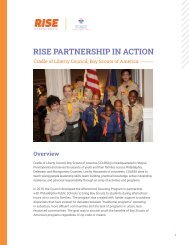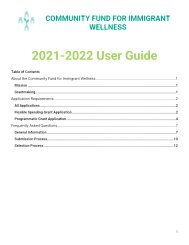PHFC_CommunityHealthChoicesGuide
You also want an ePaper? Increase the reach of your titles
YUMPU automatically turns print PDFs into web optimized ePapers that Google loves.
Community HealthChoices:<br />
Using Managed Care to Deliver<br />
Medicaid-Funded Long-Term<br />
Services and Supports (LTSS)<br />
in Pennsylvania<br />
Ann Torregrossa and Laval Miller-Wilson<br />
January 2018<br />
Page 1 of 31
Table of Contents<br />
Introduction .................................................................................................................................... 4<br />
Overview of Community HealthChoices ......................................................................................... 4<br />
The Mandatory Enrollment Categories for Community HealthChoices ......................................... 6<br />
The LIFE Program as an Alternative to Community HealthChoices ................................................ 7<br />
Community HealthChoices Benefits ............................................................................................... 7<br />
Medicare and Community HealthChoices ...................................................................................... 8<br />
The Community HealthChoices Plans ............................................................................................. 9<br />
Regional Rollout of Community HealthChoices ............................................................................ 10<br />
Enrollment & Plan Selection in Community HealthChoices ......................................................... 10<br />
Continuity of Care for Enrollees When HealthChoices Begins ..................................................... 11<br />
The Agreement between the State and Community HealthChoices MCOs ................................. 12<br />
Program Requirements ............................................................................................................. 12<br />
Standard for Long-Term Services and Supports (LTSS)............................................................. 13<br />
Amount, Duration and Scope of LTSS ....................................................................................... 14<br />
Transportation Services ............................................................................................................ 14<br />
Nursing Facility Services ............................................................................................................ 15<br />
Enrollee Self-Directed Services ................................................................................................. 15<br />
Settings for LTSS ........................................................................................................................ 15<br />
Service Delivery Innovation ...................................................................................................... 16<br />
Prior Authorization of Services ................................................................................................. 16<br />
General Continuity of Care Requirements Other Than Those When CHC Starts in a Region .. 17<br />
Choice of Provider ..................................................................................................................... 17<br />
Functional Assessments for Long Term Services and Supports ............................................... 17<br />
Service Coordinators ................................................................................................................. 19<br />
Nursing Home Transition Unit .................................................................................................. 19<br />
Coordination of Physical and Behavioral Health ...................................................................... 19<br />
Limited English Proficiency (LEP) Requirements ...................................................................... 20<br />
Alternative Format Requirements ............................................................................................ 20<br />
Participant Advisory Committee ............................................................................................... 20<br />
Participant Services ................................................................................................................... 20<br />
Complaint, Grievance, and Fair Hearing Processes ...................................................................... 21<br />
Recordkeeping Requirements .................................................................................................. 22<br />
2
Complaints vs. Grievances ........................................................................................................ 22<br />
Complaint .................................................................................................................................. 22<br />
Grievance .................................................................................................................................. 23<br />
More about the Complaint Process .......................................................................................... 23<br />
More about the Grievance Process .......................................................................................... 24<br />
External Review......................................................................................................................... 25<br />
Expedited Review Process for Grievances ................................................................................ 25<br />
Fair Hearings ............................................................................................................................. 26<br />
Continuation of Benefits Pending Appeal ................................................................................. 26<br />
Provider Dispute Resolution Processes ........................................................................................ 27<br />
Executive Management Requirements ........................................................................................ 27<br />
Electronic Visit Verification ........................................................................................................... 28<br />
Management Information Systems .............................................................................................. 28<br />
Selection and Assignment of Primary Care Physician ................................................................... 28<br />
Selection and Assignment of Service Coordinators ...................................................................... 29<br />
Provider Services ........................................................................................................................... 29<br />
Provider Network .......................................................................................................................... 29<br />
Quality Management (QM) and Utilization Management (UM) Program Requirements ........... 30<br />
Sanctions ....................................................................................................................................... 31<br />
Termination and Default ............................................................................................................... 31<br />
3
Introduction<br />
Community HealthChoices is an enormous transformation impacting nearly half<br />
a million Pennsylvanians, some of who have complex care needs; needs that<br />
require more than half of the state’s Medicaid budget.<br />
This document summarizes key elements of Pennsylvania’s approach for<br />
managed long term services and supports. It was prepared from our<br />
professional experience with the Medicaid program and it references materials<br />
publicly available on Pennsylvania’s Community HealthChoices website.<br />
Hyperlinks and citations to original sources are embedded throughout the<br />
document. Readers are strongly encouraged to read relevant statutes,<br />
regulations, bulletins, and contracts themselves for details.<br />
Overview of Community HealthChoices<br />
Pennsylvania is one of a growing number of states placing the responsibility for<br />
providing Medicaid-funded long-term services and supports (LTSS) to seniors and<br />
people with disabilities under managed care organizations (MCOs). This<br />
approach offer both significant risks and considerable opportunities.<br />
Pennsylvania’s program, called Community HealthChoices (CHC) is mandatory<br />
for dual-eligible individuals (those eligible for both Medicare and Medicaid) and<br />
individuals with physical disabilities. Starting in 2018, these populations will begin<br />
to move out of a fee-for-service (FFS) system, where the commonwealth pays<br />
each provider for delivered services. In the new managed care system, the<br />
commonwealth contracts with managed care organizations (MCOs) and pays<br />
each a fixed fee (also called capitation payment) for each participant. 1 The<br />
MCO is responsible for developing a provider network to ensure that the care is<br />
coordinated and participants receive medically necessary services. 2<br />
Pennsylvania already uses managed care for nearly 2.1 million recipients in<br />
physical health and behavioral health today. This program, called<br />
1<br />
“Participant” is used interchangeably with member, beneficiary, recipient,<br />
enrollee and consumer.<br />
2<br />
For a comparison between FFS and managed care for MLTSS visit the<br />
Community HealthChoices website.<br />
4
HealthChoices, includes all low-income children and adults between 21 and 65<br />
years of age.<br />
Community HealthChoices will totally transform how Medicaid services will be<br />
delivered and paid for 420,000 Pennsylvanians, including 130,000 who are<br />
currently receiving LTSS in the community and in nursing facilities.<br />
The prospect of changing how LTSS is authorized and financed can<br />
understandably cause anxiety among beneficiaries who fear that long standing<br />
relationships with providers who assist them in living independently may be at<br />
risk. Also, although many LTSS beneficiaries advocate effectively for themselves,<br />
the high prevalence of cognitive impairment, low literacy, and limited English<br />
proficiency in the Medicaid LTSS population elevates the importance of ensuring<br />
that all beneficiaries understand the effect of program and benefit changes. In<br />
addition, beneficiaries who receive LTSS include people with disabilities who<br />
may require alternative formats or other accommodations for communication<br />
to be accessible and effective.<br />
Community HealthChoices also poses practical challenges for MCOs since most<br />
of them have much more experience with providing and coordinating medical<br />
services geared to treating or curing illness than with providing long-term<br />
services and supports to foster and support independent living.<br />
Pennsylvania must operate Community HealthChoices Program in compliance<br />
with regulations by the Centers for Medicare and Medicaid Services. 3 The<br />
federal government has approved both of Pennsylvania’s applications to<br />
create and implement the program. One application (1915b) allows the state<br />
to operate CHC as a managed care program, but it must do so without putting<br />
3<br />
In 2016 the Centers for Medicare & Medicaid Services (CMS) issued final<br />
regulations that revise and significantly strengthen existing Medicaid managed<br />
care rules. In keeping with states’ increasingly heavy reliance on managed care<br />
programs to deliver services to Medicaid beneficiaries, including many with<br />
complex care needs, the regulatory framework and new requirements<br />
established by the final rule reflect increased federal expectations regarding<br />
fundamental aspects of states’ Medicaid managed care programs.<br />
5
anyone on a waiting list. The other application (1915c) allows the state to offer<br />
home and community-based services to older adults and people with physical<br />
disabilities.<br />
The Mandatory Enrollment Categories for Community HealthChoices<br />
Adults older than age 21 in the following categories are required enroll in<br />
Community HealthChoices: 4<br />
● Those receiving both Medicare and Medicaid (dual eligibles), regardless<br />
of whether they receive LTSS<br />
● Those receiving long-term care waiver services through the Aging, 5<br />
Attendant Care, 6 Independence 7 or COMMCARE 8 waivers<br />
● Those determined nursing facility clinically eligible and in a nursing facility<br />
paid for by the state or in the OBRA 9 waiver<br />
Not included in Community HealthChoices are the following adults:<br />
● Those in a state-operated nursing facility or veterans’ home<br />
● Those with intellectual disabilities receiving services paid by DHS’ Office of<br />
Developmental Programs.<br />
● Those in the Living Independence for the Elderly Program (LIFE)<br />
● Those remaining in the state’s OBRA waiver program<br />
4<br />
Historical enrollment data for Community HealthChoices can be found at:<br />
http://www.healthchoices.pa.gov/info/resources/publications/community/historicaldata-summary/index.htm<br />
5<br />
For Aging waiver eligibility and services, see:<br />
http://www.dhs.pa.gov/citizens/alternativestonursinghomes/agingwaiver/<br />
6<br />
Act 150 and Attendant Care waiver services are the same.<br />
7<br />
For eligibility and services for the Independence Waiver, see:<br />
http://www.dhs.pa.gov/citizens/alternativestonursinghomes/independencewaiv<br />
er/<br />
8<br />
For eligibility and services for the COMMCARE waiver, see:<br />
http://www.dhs.pa.gov/citizens/alternativestonursinghomes/commcarewaiver/<br />
9<br />
For eligibility and services for the OBRA waiver, see:<br />
http://www.dhs.pa.gov/citizens/alternativestonursinghomes/obrawaiver<br />
6
The LIFE Program as an Alternative to Community HealthChoices<br />
Dual eligibles meeting the nursing facility level of care criteria may choose to<br />
receive services from LIFE in lieu of Community HealthChoices. The LIFE Program<br />
combines Medicaid and Medicare funding in a managed care program that<br />
provides comprehensive health and support services to seniors (over 55) who<br />
wish to live in their homes. The LIFE program provides home and transportation<br />
services, and a day center where participants can receive meals and health<br />
care and participate in activities. Eligibility and benefits for the LIFE Program can<br />
be found at:<br />
http://www.dhs.pa.gov/citizens/alternativestonursinghomes/lifelivingindepende<br />
ncefortheelderly/<br />
LIFE Program locations and contact information can be found at:<br />
http://www.dhs.pa.gov/cs/groups/webcontent/documents/document/c_22194<br />
8.pdf<br />
Community HealthChoices Benefits<br />
There is no decrease in the benefits previously provided with the change to<br />
Community HealthChoices, and pest eradication has been added. 10 LTSS<br />
Benefits can be viewed at:<br />
http://www.healthchoices.pa.gov/cs/groups/webcontent/documents/docume<br />
nt/c_264103.pdf<br />
Medicaid State Plan Behavioral Health Services are excluded from Community<br />
HealthChoices’ Covered Services. No mental health or drug and alcohol<br />
services will be covered by the CHC-MCOs. Everyone going into CHC will<br />
receive their Medicaid behavioral health coverage from their county’s<br />
behavioral health plan. This will be new to people who have been in the Aging<br />
Waiver and to nursing home residents. 11<br />
10<br />
See:<br />
http://www.healthchoices.pa.gov/cs/groups/webcontent/documents/docume<br />
nt/c_264102.pdf<br />
11<br />
For the behavioral health plans by county, see:<br />
http://www.healthchoices.pa.gov/providers/about/behavioral/index.htm<br />
7
Important note: If the CHC participant accessing behavioral health services is a<br />
dual eligible, the provider will bill Medicare first and then the Medicaid<br />
behavioral health plan. The CHC-MCO will be required to coordinate<br />
behavioral health services.<br />
Medicare and Community HealthChoices<br />
Dual eligibles moving to Community HealthChoices will continue to have<br />
Medicare as their primary coverage. Their mandatory move to CHC is only<br />
changing their secondary Medicaid coverage.<br />
Dual eligibles continue to have Medicare plan choices. 12 They can either:<br />
● Receive Medicare Part A and Part B services through the Original<br />
Medicare Program, and join a stand-alone Prescription Drug Plan or<br />
● Receive Part A and Part B services from a Medicare Advantage Plan,<br />
private insurance companies that provide all Part A and Part B services<br />
and may provide prescription drug coverage and other supplemental<br />
benefits.<br />
Community HealthChoices plans must have a Medicare-approved Dual Special<br />
Needs Plan (D-SNP plan), but consumers are not required to enroll in that<br />
Medicare D-SNP. Again, if a dual eligible is happy with her current Medicare<br />
coverage, she can keep the Medicare coverage she has. Even when dual<br />
eligibles are enrolled in a Medicare D-SNP affiliated with CHC plan, Medicaid is<br />
still their second, separate insurance coverage.<br />
12<br />
Reminder that Medicare consists of four different parts:<br />
● Part A – Hospital insurance (inpatient hospital care, inpatient care in a<br />
Skilled Nursing Facility, hospice care, and some home health services)<br />
● Part B – Medical insurance (physician services, outpatient care, durable<br />
medical equipment, home health services, and many preventive services)<br />
● Part C – Medicare Advantage (MA) (Medicare-approved private<br />
insurance companies provide all Part A and Part B services and may<br />
provide prescription drug coverage and other supplemental benefits).<br />
Dual Special Needs Plans are private insurance plans that only enroll<br />
Medicare beneficiaries who also have Medicaid (dual eligibles).<br />
● Part D – The Prescription Drug Benefit (Medicare-approved private<br />
companies provide outpatient prescription drug coverage).<br />
8
If the CHC participant accessing behavioral health services is a dual eligible, the<br />
provider will bill Medicare first and then the Medicaid behavioral health plan.<br />
For services covered by Medicare, the Medicare provider must be enrolled in<br />
the Medicaid program, but need not also be in the behavioral health plan<br />
network to get paid. If the dual eligible participant is trying to access a service<br />
not covered by Medicare (for example, intensive outpatient drug & alcohol<br />
services or mobile mental health treatment), their Medicaid behavioral health<br />
plan will be their only coverage and so they must go to providers within their<br />
plan’s network and follow any other rules the plan has for their plan to cover the<br />
service.<br />
Finally, CHC plans are expected to coordinate services between Medicare and<br />
Medicaid covered services regardless of the type of Medicare coverage. It<br />
remains to be seen whether and how CHC plans will meet this service<br />
coordination expectation, especially when the CHC participant selects a<br />
Medicare plan that is not aligned with their CHC plan--i.e., either Original<br />
Medicare or a different Medicare Advantage Plan.<br />
The Community HealthChoices Plans<br />
The commonwealth selected three managed care organizations to serve<br />
enrollees across Pennsylvania. All three CHC-MCOs will have to develop a LTSS<br />
network across the state, starting with the Southwest zone:<br />
1. AmeriHealth Caritas is a Pennsylvania-based non-profit company<br />
providing coverage in 14 states for 5.7 million people. It has operated a<br />
HealthChoices MCO in Pennsylvania for a long time, although not in every<br />
region of the state. Although it provides LTSS in other states, it has not<br />
done so in Pennsylvania.<br />
It is worth noting that in November 2017 AmeriHealth Caritas’ voluntarily<br />
withdrew from providing services in Iowa. AmeriHealth Caritas covered<br />
more than 23,400 out of nearly 37,400 members receiving LTSS, while the<br />
other MCOs Amerigroup and UnitedHealthcare covered roughly 7,600<br />
and 6,300 members, respectively.<br />
2. Pennsylvania Health and Wellness (Centene) is a publicly traded<br />
company that operates in 14 states, serving 12 million people. It has<br />
9
grown to become the largest Medicaid managed care plan in the<br />
country. It has experience operating LTSS MCOs in other states, but it is<br />
new to Pennsylvania and will have to develop LTSS and physical health<br />
networks across the state.<br />
3. UPMC for You is a Pennsylvania based non-profit company owned UPMC<br />
by UPMC, a hospital and health care system. UPMC for You has primarily<br />
served HealthChoices enrollees in the western part of the state, although<br />
it has expanded to other parts of the state. UPMC for You does not have<br />
experience providing LTSS.<br />
Regional Rollout of Community HealthChoices<br />
The five zones for Community HealthChoices match Pennsylvania’s Physical<br />
HealthChoices zone. CHC will be implemented according to the following<br />
schedule: 13<br />
● Southwest Region (14 counties): January 1, 2018<br />
● Southeast Region (5 counties): January 1, 2019<br />
● Lehigh/Capital, Northwest and Northeast Regions (48 counties): January<br />
1, 2020<br />
Enrollment & Plan Selection in Community HealthChoices<br />
Pennsylvanians being moved to CHC will receive information about enrolling in<br />
a CHC plan at least 45 days before having to choose one of the three CHC<br />
MCOs. If these individuals do not make a plan choice by the deadline, the<br />
state will pick a CHC plan for them.<br />
Nearly half of the affected population in the Southwest zone (40,000 out of<br />
80,000 participants) chose a CHC plan for themselves by the initial enrollment<br />
deadline of November 13. The rest were auto-assigned to one of the three CHC<br />
plans available: AmeriHealth Caritas, PA Health & Wellness or UPMC.<br />
13<br />
See:<br />
http://www.healthchoices.pa.gov/cs/groups/webcontent/documents/docume<br />
nt/c_237795.pdf for list of counties in each HealthChoices region.<br />
10
Individuals who did not choose could still select a CHC-MCO after the<br />
November 13th deadline. If they enroll in a plan before the end of the year,<br />
their plan choice will start on January 1st and will override any plan assignment<br />
made by the state.<br />
Significantly, individuals in Community HealthChoices are not “locked in” to a<br />
CHC plan. Similar to the state’s Physical HealthChoices program, Community<br />
HealthChoices consumers can change MCOs whenever they need to without<br />
having to go through a formal process of proving they have a good reason to<br />
change plans. This singular freedom of choice feature of enrollment, plan<br />
selection, and disenrollment is an important and distinguishing feature of<br />
Pennsylvania’s MLTSS approach.<br />
Continuity of Care for Enrollees When HealthChoices Begins<br />
Continuity of care is particularly important for CHC participants receiving longterm<br />
services and supports, and for that reason CHC participants can remain<br />
with their current LTSS provider for a limited period of time.<br />
Community HealthChoices includes the following continuity of care provisions to<br />
minimize interruptions in care when HealthChoices begins in a region: 14<br />
● Any person residing in nursing facility when Community HealthChoices is<br />
implemented in a region may continue to live at the facility as long as<br />
they are enrolled in Community HealthChoices, unless the facility drops<br />
out of the Medicaid Program. A temporary hospitalization or change in<br />
Community HealthChoices MCO does not change this as long as the<br />
person is considered a resident of the facility.<br />
● For persons receiving home and community based waiver services, the<br />
CHC-MCO must continue to reimburse those providers for 180 days or until<br />
a comprehensive needs assessment has been conducted and a personcentered<br />
service is plan is created, whichever is later.<br />
● After that 180-day period ends, the CHC plan can require their members<br />
use waiver providers that are “in-network” with the plan. The plan could<br />
14<br />
The Bulletin regarding continuity of care when transferring between MCOs can<br />
be found at:<br />
http://www.dhs.pa.gov/publications/bulletinsearch/bulletinselected/index.htm?<br />
bn=99-03-13<br />
11
also revisit the person’s service plan and decide to reduce, change or<br />
terminate a service. If this happens, the individual can appeal the plan’s<br />
decision.<br />
● The 180-day continuity of care provision ending date for new zones<br />
implementing CHC is<br />
o June 30, 2018 for Southwest<br />
o June 30, 2019 for Southeast<br />
o June 30, 2020 for Lehigh Capital, NW and NE<br />
The Agreement between the State and Community HealthChoices MCOs<br />
The contract between Pennsylvania and the CHC-MCOs is a critical and lengthy<br />
document that sets forth the requirements CHC-MCOs must provide for all<br />
covered services and related services to Participants. We have summarized<br />
some of the most significant provisions of the 350+ page Agreement. The final<br />
agreement was not publicly available at the time of publication but will be<br />
posted to the CHC website.<br />
The term of the Agreement is five years starting January 1, 2018, with a state<br />
option to renew for two years. Given the staggered regional implementation,<br />
unless the contract is extended, it would be in effect in SW for 5 years, SE for 4<br />
years and the rest of the state for only 3 years.<br />
Program Requirements<br />
National Accreditation. All CHC-MCOs must be accredited by the National<br />
Committee for Quality Assurance (NCQA), a not-for-profit organization<br />
dedicated to improving health care quality or by another national<br />
accreditation body. Plans not accredited at the start of the contract have until<br />
the end of the second calendar year of the contract to do so. Once<br />
accredited, plans must maintain accreditation throughout the contract. Note<br />
that NCQA does not have accreditation for LTSS, but is reported to be working<br />
on one. So, the accreditation is only for the medical/clinical aspects of the<br />
MCO, not LTSS.<br />
D-SNP Program. CHC-MCOs must have a Medicare-approved Dual Special<br />
Needs Plan (D-SNP plan) in operation by the start of implementation in each<br />
zone. The D-SNP plan must enter into a MIPPA Agreement with the state, which<br />
must be approved by CMS.<br />
12
For MIPPA requirements visit: http://www.cms.gov/Regulations-and-<br />
Guidance/Guidance/Manuals/Downlods/mc86c16b.pdf<br />
The agreement between the state and all D-SNP plans can be found here:<br />
http://www.healthchoices.pa.gov/info/resources/publications/community/mipp<br />
a-documents/index.htm<br />
Standard for Long-Term Services and Supports (LTSS)<br />
CHC Plans must assure that all covered services are medically necessary, which<br />
is defined in the Agreement as meeting any one of the following standards:<br />
● Will, or is reasonably expected to, prevent the onset of an illness, condition<br />
or disability<br />
● Will, or is reasonably expected to, reduce or ameliorate the physical,<br />
mental or developmental effects of an illness, condition, injury or disability<br />
● Will assist a Participant to achieve or maintain maximum functional<br />
capacity in performing daily activities, considering both the functional<br />
capacity of the Participant and those functional capacities that are<br />
appropriate for Participants of the same age<br />
● Will provide the opportunity for a Participant receiving LTSS to have<br />
access to the benefits of community living, to achieve person-centered<br />
goals, and live and work in the setting of his or her choice.<br />
Medical necessity must be “based on medical information provided by a<br />
Participant, the Participant’s family or caretaker and PCP, as well as other<br />
Providers, programs or agencies that have evaluated the Participant. A<br />
determination of Medically Necessary services must be made by qualified and<br />
trained Providers with clinical expertise comparable to the prescribing Provider.<br />
The medical necessity definition becomes critical when representing enrollees<br />
challenging reductions in services and denial of services prescribed by their<br />
providers. See section below.<br />
13
Amount, Duration and Scope of LTSS<br />
CHC plans “must provide services that are sufficient in amount, duration, or<br />
scope to reasonably be expected to achieve the purpose for which the services<br />
are furnished”. Services are listed in Appendix A of the Agreement. Home and<br />
community-based services must be available 24-hours a day/seven days a<br />
week.<br />
CHC-Plans can do more than the minimum. Plans are encouraged to offer LTSS<br />
as expanded services to enrollees who are not Nursing Facility Clinically Eligible<br />
(NFCE). MCOs may provide “individually tailored services” in addition to the<br />
covered services when they are identified by the person-centered screening<br />
process are appropriate to support the enrollee in the community.<br />
Pharmacy services. The CHC-MCO must provide pharmacy services and over<br />
the counter drugs to duals that are not covered by Medicare Part D and<br />
pharmacy services for all other enrollees. The MCO must offer assistance to<br />
enrollees to choose a Medicare Part D plan with zero co-pay.<br />
Transportation Services<br />
Given the high needs of the CHC population and the trend toward greater use<br />
of non-medical benefits, non-emergency medical transportation is an important<br />
part of Community HealthChoices. The Agreement states that the Medical<br />
Assistance Transportation Program (MATP), which is primarily county based, is<br />
responsible for the following:<br />
● Non-emergency transportation to a medical service that is covered by<br />
Medicare or CHC. This includes transportation for urgent care<br />
appointments. Participants whose service is paid by Medicare can<br />
receive MATP service.<br />
● Transportation to another county, as medically necessary, to get medical<br />
care as well as advice on locating a train, bus, and route information.<br />
● Reimbursement for mileage, parking, and tolls with valid receipts, if the<br />
Participant used her own car or someone else's car to get to the Provider.<br />
14
CHC-MCOs also bear some transportation responsibilities. The CHC-MCO must<br />
provide all NFCE Participants with non-medical transportation. Non-medical<br />
transportation includes transportation to community activities, grocery shopping,<br />
religious services, Adult Daily Living centers, employment and volunteering, and<br />
other activities or LTSS services as specified in the Participant’s PCSP. The CHC-<br />
MCO may provide non-medical transportation to other Participants at its own<br />
discretion and own cost.<br />
Finally, the Agreement states the CHC-MCO must provide non-emergency<br />
medical transportation for nursing facility residents, including transportation for<br />
NF residents who are stretcher-bound. However, it is unclear whether CHC-<br />
MCOs must provide transportation when the NF residents medical service is<br />
covered by Medicare.<br />
Nursing Facility Services<br />
CHC-MCO requirements for nursing facility payments, including bed hold and<br />
therapeutic leave days are set forth in the Agreement. CHC-MCOs are required<br />
to contract with any nursing facility enrolled in Medicaid that accepts the<br />
MCO’s payment rate and complies with quality assurance requirements for 18<br />
months. The state may require this time to be extended.<br />
Enrollee Self-Directed Services<br />
CHC-MCOs must offer its members eligible for LTSS, the opportunity to self-direct<br />
personal assistance services, instead of the traditional MCO model of using an<br />
agency. Under this model, enrollees may employ any “state qualified” personal<br />
assistant to provide care including a family member or neighbor.<br />
Settings for LTSS<br />
These services must be provided in the least restrictive and most integrated<br />
setting. If NFCE enrollees are living in settings at time of implementation that do<br />
not comply with state law, such as personal care homes, they will be allowed to<br />
remain there while in CHC.<br />
15
Service Delivery Innovation<br />
The agreement requires CHC-MCOs to work with the state and other<br />
collaborations on service delivery innovation, particularly with housing.<br />
Prior Authorization of Services<br />
CHC-MCOs may require prior authorization for any service where it is required<br />
under FFS, but must have written policies approved by the state. Exhibit E of the<br />
Agreement contains the guidelines for prior authorization and other<br />
requirements.<br />
Denials of requested services must be in writing and in accessible formats for<br />
persons with disabilities, the visually impaired and persons with limited English<br />
proficiency. CHC plans must process requests for prior authorization within two<br />
business days or faster if the enrollee’s health requires it with written notice to the<br />
enrollee, the enrollee’s Primary Care Physician (PCP) and the prescribing<br />
provider.<br />
If the CHC plan requests additional information, and it is received within 14 days,<br />
the plan must make a decision within 2 business days of the receipt of the<br />
information. If the requested information is not received within 14 days of the<br />
request, the plan must approve or deny the service based on the information<br />
that is available. If the enrollee has not received a decision within 21 days of the<br />
request for prior authorization, the requested service is deemed automatically<br />
approved.<br />
The CHC plan will be considered to have met the notice requirement if the<br />
notice is mailed to the enrollee and providers within 18 days of the request. If<br />
the enrollee is receiving the services subject to the prior authorization request,<br />
the CHC-MCO must mail written notice of denial at least ten days before the<br />
effective date services will be denied.<br />
16
General Continuity of Care Requirements Other Than Those When CHC Starts in a Region<br />
If a person transfers to a different MCO six months after implementation in a<br />
region, the receiving MCO must continue paying the consumer’s providers for 60<br />
days or until a comprehensive needs assessment has been conducted and a<br />
person-centered service is plan is created, whichever is later.<br />
● Persons admitted to a nursing facility after the implementation of<br />
Community HealthChoices will have the standard 60 days of continuity of<br />
care.<br />
● If an enrollee is receiving LTSS has a provider who leaves the plan network,<br />
the CHC MCO must continue to allow the enrollee to receive services<br />
from that provider for 60 days, pay the provider, until alternative provider<br />
services can be arranged.<br />
Choice of Provider<br />
Enrollees must have a choice of providers, including service coordinators within<br />
the plan network and the MCO may not try to influence this choice.<br />
Functional Assessments for Long Term Services and Supports<br />
For individuals to receive Medicaid-covered LTSS, they must be determined<br />
nursing facility clinically eligible (NFCE). This means an individual must meet the<br />
state’s defined functional eligibility criteria, which are based on physical and<br />
cognitive abilities. To determine whether an individual meets the state’s<br />
functional eligibility criteria, Pennsylvania uses sets of questions that collect<br />
information on an applicant’s health conditions and functional needs. CHC<br />
plans are not involved in this determination.<br />
The CHC-MCO must conduct a comprehensive needs assessment of every<br />
Participant who is determined NFCE. The state is requiring CHC MCOs to use the<br />
InterRAI HC 15 tool for this assessment. This is far more intensive and takes longer<br />
than the NFCE determination. It includes physical and behavioral health, social,<br />
15<br />
InterRAI is a collaborative network of researchers and practitioners committed<br />
to improving care for persons who are disabled or medically complex. The<br />
University of Michigan provides significant research support for this organization<br />
and the development of assessment tools. InterRAI survey instruments cover a<br />
range of assessments including but not limited to the determination of clinical or<br />
functional limitations, the identification of unmet needs, and the match of<br />
services with needs to support the requirements of assessed individuals.<br />
17
psychosocial, environmental, caregiver, LTSS and other needs, including the<br />
CHC participant’s stated preferences, goals, housing and informal supports.<br />
The information from the comprehensive needs assessment informs the amount<br />
and scope of LTSS. The CHC-MCO is responsible for developing a Person-<br />
Centered Service Plan (PCSP) for every CHC participant who requires LTSS. That<br />
plan must address how the enrollee’s physical, cognitive and behavioral health<br />
needs will be managed and coordinated with Medicare coverage (if<br />
applicable) and coordinated with the LTSS. The components of the Care<br />
Management Plan and LTSS Plan are listed the Agreement and must be<br />
completed no more than 30 days from the date of the comprehensive needs<br />
assessment.<br />
If the Participant has not been determined NFCE, then the CHC-MCO must<br />
conduct a comprehensive assessment of a Participant when the Participant<br />
requests a comprehensive assessment or self-identifies as needing LTSS or if<br />
either the CHC-MCO or the Independent Enrollment Broker (IEB) identifies that<br />
the Participant has unmet needs, service gaps, or a need for Service<br />
Coordination.<br />
The Agreement has hard deadlines for when comprehensive needs assessments<br />
must be done:<br />
● within 5 days for NCFE enrollees not receiving LTSS on enrollment date.<br />
● within 5 days for dually eligible enrollees identified by the independent<br />
enrollment counselor as needing immediate services.<br />
● within 15 business days of the CHC-MCO being aware that an enrollee<br />
has unmet needs, service gaps or a need for a Service Coordinator<br />
● within 90 days of enrollment for those not NCFE, the CHC-MCO must do<br />
an assessment for unmet needs such as: health care needs needing<br />
chronic or disease management, service gaps or need for service<br />
coordination.<br />
● within 180 days of the start date for enrollees with existing person centered<br />
service plans<br />
● within 15 days when requested by enrollees, their designee or family<br />
member<br />
● within 12 months following the most recent comprehensive needs<br />
assessment unless a triggering event occurs<br />
18
● within 14 days of a triggering event or earlier if the circumstances or<br />
clinical condition requires a quicker response<br />
● every 12 months for those with a need for service coordination and must<br />
include assessment of physical and behavioral health, “social,<br />
psychosocial, environmental, caregiver, LTSS and other needs as well as<br />
preferences, goals, housing and informal supports”<br />
● Reassessments must also be done within 14 days of a triggering event,<br />
which includes a hospitalization, change in functional status, change in<br />
caregiver of informal supports or home setting that impacts health or<br />
functional status, non-temporary or episodic change in diagnosis that<br />
impacts health or functioning, a request by the enrollee, designee,<br />
caregiver a provider, or the state<br />
Service Coordinators<br />
Service coordination is a core component of Community HealthChoices.<br />
Service Coordinators lead the Person-Centered Service Plan (PCSP) process,<br />
oversee their implementation and assist enrollees needing LTSS to obtain the<br />
services they need. The CHC-MCOs must annually submit a PCSP staffing plan<br />
for service coordination for approval by the State, that includes staffing ratios,<br />
and after-hours and emergency staffing, frequency of contact and how real<br />
time information about enrollees will be received and shared, including patient<br />
encounters. The CHC-MCO must provide enrollees with a choice of at least two<br />
service coordinators.<br />
Nursing Home Transition Unit<br />
All MCOs must have a nursing home transition unit to work with nursing home<br />
resident enrollees who wish to transition back to the community. Some enrollees<br />
in nursing homes will not be able to transition back to the community and keep<br />
their Medicaid coverage for LTSS because under MA eligibility rules, nursing<br />
home residents who have income over the MA limit may use that income to<br />
“spend down” to pay for the nursing home care until they reach the MA income<br />
level. Spend down is not permitted for LTSS in the community.<br />
Coordination of Physical and Behavioral Health<br />
HealthChoices uses different MCOs to provide behavioral health services and<br />
this separation continues with Community HealthChoices. The contract requires<br />
the CHC MCO to enter into a coordination agreement with the BH MCO, which<br />
must be approved by the State. MCOs must use information exchanges with<br />
19
data provided by the State to control avoidable hospital admissions and<br />
readmissions and ER data for enrollees with serious mental illness, substance<br />
abuse disorder or both and coordination mechanisms to reduce the use of<br />
psychotropic medications prescribed to enrollees.<br />
Enrollees can enroll in a different MCO or the LIFE Program and the MCO is<br />
prohibited from preventing or restricting an enrollee from make these changes.<br />
The MCO must participate in discharge planning for 6 months after the enrollee<br />
has left the plan. The agreement has clear standards about MCO outreach<br />
materials and enrollment materials, requirements for development of outreach<br />
materials to be used by the independent enrollment counselor and enrollee<br />
handbooks, and prohibited marketing activities by MCOs (e.g., “products of<br />
value” given to enrollees or prospective enrollees).<br />
Limited English Proficiency (LEP) Requirements<br />
MCOs are required to identify LEP enrollees and provide, at no costs to enrollees<br />
oral interpretation services to LEPs, and interpretative services to those who are<br />
deaf and/or blind and alternate format materials and materials in languages<br />
designated by the State.<br />
Alternative Format Requirements<br />
The MCO must provide alternative methods of communication for enrollees who<br />
have neurocognitive impairments or who are visually and/or hearing impaired,<br />
including Braille, audio tapes, large print, discs, special support services,<br />
electronic communication, etc.<br />
Participant Advisory Committee<br />
Each CHC-MCO must establish an Advisory Committee for each CHC zone that<br />
includes enrollees, providers, and direct care work representative. The enrollee<br />
representative must reflect the population being served, geographic<br />
representation and family members, with provider representatives that include<br />
physical, behavioral and dental health and LTSS. Sixty percent must be enrollee<br />
representatives, with 25% receiving LTSS. In-person meetings must be at least<br />
quarterly with MCOs reimbursing for travel and accommodation expenses.<br />
Participant Services<br />
Enrollees must be able to reach the plan during regular business hours (9:00AM-<br />
5:00PM, Monday through Friday) plus one evening (5:00 PM-8:00PM or one<br />
20
weekend per month) to address non-emergency problems and arrangements<br />
to be able to reach the MCO for emergency enrollee problems 24 hours a day,<br />
7 days a week.<br />
Dedicated Hotline. The MCO must staff a 24-hour a day 7 day a week dedicate<br />
toll-free hotline to respond to enrollee’s issues and problems regarding services.<br />
Callers must be asked if they are satisfied with the respond and if not the<br />
enrollee must be referred to the appropriate person in the MCO for follow-up<br />
and resolution within 48 hours.<br />
Nurse Hotline. MCOs must also staff a nurse hotline 24 hours a day, seven days a<br />
week to deal with enrollee’s urgent health needs.<br />
Complaint, Grievance, and Fair Hearing Processes<br />
All CHC plans have certain responsibilities related to notifying their members<br />
(enrollees) of appeal rights. If a CHC-MCO plan denies service or payment, in<br />
whole or in part, the CHC plan is required to provide the enrollee with a written<br />
notice of its determination. Additionally, enrollees receiving covered services<br />
(e.g., inpatient hospital, home health agency, or comprehensive outpatient<br />
rehabilitation) have the right to a fast, or expedited, review if they think their<br />
Medicaid -covered services are ending too soon. The CHC-MCO must also<br />
continue the enrollee’s services if the appeal is filed timely.<br />
Exhibit G of the Agreement between the state and MCOs details the processes<br />
each plan must follow 16 . We summarize some the core elements below:<br />
16<br />
Federal regulations set forth the requirements for beneficiary support for LTSS.<br />
See: 42 C.F.R. 438.71. They include:<br />
(1) An access point for complaints and concerns about plan enrollment, access<br />
to covered services, and other related matters.<br />
(2) Education on grievance and appeal rights within the plan; the fair hearing<br />
process; enrollee rights and responsibilities; and additional resources outside of<br />
the plan.<br />
(3) Assistance, upon request, in navigating the grievance and appeal process<br />
within the plan, as well as appealing adverse benefit determinations by the plan<br />
to a fair hearing. (no representation, but only referral at fair hearings)<br />
(4) Review and oversight of LTSS program data to provide guidance to the DHS<br />
on identification, remediation and resolution of systemic issues.<br />
21
At the outset, each CHC-MCO must obtain the Department’s prior written<br />
approval of its complaint, grievance and fair hearing policies and procedures.<br />
Recordkeeping Requirements: Each CHC-MCO must maintain accurate written<br />
records of complaints and grievances. The state will review the information as<br />
part of its ongoing monitoring. The plan’s records must be accessible to the<br />
state. An enrollee’s appeal record must, at least, contain: (1) a general<br />
description of the reason for the complaint or grievance; (2) date received; (3)<br />
date of review; (4) resolution; (5) date of resolution; and (6) name of the enrollee<br />
for whom the complaint or grievance was filed.<br />
CHC-MCO must also satisfy the state that there are protections in place for oral<br />
appeals, to ensure that the appeal is acknowledged and the resolution<br />
timeframe runs from the date the oral appeal is received by the managed care<br />
plan.<br />
Complaints vs. Grievances: Enrollees can file either complaints or grievances,<br />
depending on the nature of the disagreement. And assuming written consent<br />
of the enrollee, a provider or authorized representative may file a complaint or<br />
grievance on the enrollee’s behalf.<br />
Complaint: A complaint allows enrollees to express dissatisfaction with matters<br />
that are not adverse benefit determinations, such as being treated rudely. In<br />
simplest terms, and as noted in the CHC-MCO’s member handbook, a<br />
complaint is triggered “if you are unhappy about the care or treatment you<br />
have received.” 17 According to the Agreement, Complaints also include<br />
enrollees’ disputes over an extension of time proposed by a CHC-MCO to make<br />
an authorization decision. It can include enrollees’ disputes involving “cost<br />
sharing, copayments, premiums, deductibles, coinsurance, and other enrollee<br />
financial liabilities.”<br />
17<br />
The member handbook template the state has instructed CHC-MCOs to use<br />
states: “A Complaint is when you tell [CHC-MCO Name] you are unhappy with<br />
[CHC-MCO Name] or your provider or do not agree with a decision by [CHC-<br />
MCO Name]. Some things you may complain about: you are unhappy with the<br />
care you are getting, you cannot get the service or item you want because it is<br />
not a covered service or item, you have not gotten services that [CHC-MCO<br />
Name] has approved.”<br />
22
Grievance: The event that triggers a grievance is an “adverse benefit<br />
determination.” Again, in simplest terms, and as noted in the CHC-MCO’s<br />
member handbook, a grievance is “When [CHC-MCO Name] denies,<br />
decreases, or approves a service or item different than the service or item you<br />
requested because it is not medically necessary.” Grievances are about the<br />
denial, reduction, suspension, termination or delay of a covered service. In<br />
addition to denials based on medical necessity, grievances can be denials or<br />
limited authorization determinations of a covered benefit based on<br />
appropriateness, setting, or effectiveness.<br />
More about the Complaint Process: Some complaints have a time limit on filing.<br />
Enrollees must file a complaint within 60 days of getting a written notice that<br />
states:<br />
● a denial because the service or item is not a Covered Service;<br />
● the failure of the CHC-MCO to provide a service or item in a timely<br />
manner;<br />
● the failure of the CHC-MCO to decide a Complaint or Grievance within<br />
the specified time frames;<br />
● a denial of payment after the service or item has been delivered because<br />
the service or item was provided without authorization by a provider not<br />
enrolled in the Medicaid Program;<br />
● a denial of payment after the service or item has been delivered because<br />
the service or item provided is not a covered service for the participant; or<br />
● a denial of a participant’s request to dispute a financial liability, including<br />
cost sharing, copayments, premiums, deductibles, coinsurance, and other<br />
participant financial liabilities.<br />
For all other complaints, there is no time limit for filing a first level Complaint.<br />
Enrollees who file complaints will get a letter from the CHC-MCO acknowledging<br />
receipt of the complaint and describing the complaint review process. There<br />
are two levels of complaints: a first level and a second level. Both use the same<br />
procedures. Enrollee attendance is optional. Enrollees can attend the<br />
complaint review in person, by phone, or by videoconference. If an enrollee<br />
decides not to attend the complaint review, it should not affect the decision.<br />
23
A committee of one or more CHC-MCO staff who were not involved in and do<br />
not work for someone who was involved in the issue the enrollee has filed the<br />
complaint about will meet to make a decision. If the complaint is about a<br />
clinical issue, a licensed doctor will be on the committee.<br />
Enrollees can ask the CHC-MCO for any information the CHC-MCO has about<br />
the issue filed about at no cost to the enrollee. Enrollees can also send<br />
information to the CHC-MCO.<br />
The CHC-MCO must mail the enrollee a decision no more than 30 days from<br />
receipt of the enrollee’s complaint. The notice will also tell enrollees what to do<br />
if they do not like the decision.<br />
More about the Grievance Process: Unlike the complaint process, there is only one<br />
level for grievances; however, enrollees must exhaust that grievance before<br />
requesting a state fair hearing.<br />
The enrollee must file the appeal within 60 calendar days from the date of the<br />
adverse benefit determination notice from the CHC-MCO.<br />
The appeal can be filed orally or in writing (which includes online filing).<br />
CHC-MCOs must have a process for handling grievances that: (1)<br />
acknowledges receipt, (2) ensures that the individual who make the decisions<br />
on the grievance were neither involved in any previous level of review or<br />
decision-making nor a subordinate of any such individual, and (3) are individuals<br />
with “appropriate clinical expertise in treating the enrollee’s condition or<br />
disease,” if the appeal involves denial based on no medical necessity.<br />
CHC-MCOs must give the enrollee “any reasonable assistance” in completing<br />
forms and other procedural steps to file a grievance, including auxiliary aids,<br />
upon request, including providing interpreter services and toll-free numbers that<br />
are accessible to people with disabilities.<br />
When deciding the grievance CHC-MCO must take into account all comments,<br />
documents, records, and other information submitted by the enrollee, including<br />
information that was not submitted to or considered in the initial adverse<br />
determination. The plan must also provide the enrollee with a reasonable<br />
opportunity, “in person and in writing,” to present evidence and make legal and<br />
factual arguments. The CHC-MCO must provide the enrollee and his<br />
24
epresentative with the case file, including medical records and any new or<br />
additional evidence considered or generated by or at the direction of the CHC-<br />
MCO in connection with the appeal. This information must be provided free of<br />
charge and sufficiently in advance.<br />
CHC-MCOs must resolve grievances as expeditiously as the enrollee’s health<br />
condition requires. The CHC-MCO must mail the enrollee a decision no more<br />
than 30 days from receipt of the enrollee’s grievance. These timeframes can be<br />
extended by up to 14 calendar days if the enrollee requests it or the CHC-MCO<br />
shows to the satisfaction of the state agency that there is a need for additional<br />
information and how the extension is in the enrollee’s interest.<br />
External Review<br />
If an enrollee is not satisfied with the CHC-MCO’s complaint or grievance<br />
decisions, she can file for an External Review of the decision outside the CHC-<br />
MCO. The enrollee must send a letter to the CHC-MCO within 15 days of the<br />
date of receiving the plan’s grievance decision. The letter is forwarded to the<br />
Department of Health who will assign an organization outside of the CHC-MCO<br />
(called a Certified Review Entity or CRE) to review the plan’s decision. The CHC-<br />
MCO will send the CRE a copy of the enrollee’s grievance file to review. The<br />
enrollee can also send the CRE any additional information that may support<br />
their appeal. The CRE will issue a decision within 60 days of the date the External<br />
Grievance was filed. Once a decision is made, a copy will be sent to the<br />
enrollee. The letter will tell the enrollee the reasons for the decision and what the<br />
enrollee can do if he/she disagrees with the decision.<br />
Expedited Review Process for Grievances<br />
CHC-MCOs must have an expedited review process for grievances. An<br />
expedited appeal occurs when the plan determines (for a request from the<br />
enrollee) or the provider indicates (in making the request on the enrollee’s<br />
behalf or in support of the enrollee’s request) that taking the time for standard<br />
resolution “could seriously jeopardize the enrollee’s life, physical or mental<br />
health, or ability to attain, maintain, or regain maximum function.” CHC-MCOs<br />
must ensure that punitive actions are not taken against providers who seek<br />
expedited resolutions. If the CHC-MCO denies the enrollee’s request, it must<br />
process the appeal under the requirements for standard resolution and give the<br />
enrollee notice of their right to file a grievance if she disagrees with the decision<br />
to deny expedited resolution.<br />
25
Fair Hearings<br />
In most complaint and all grievance matters, an enrollee can ask the state’s<br />
Department of Human Services to hold a hearing, called a “fair hearing.” They<br />
can be requested, in writing, after a CHC-MCO decides a first level complaint or<br />
decides a grievance. An enrollee must file for a Fair Hearing writing within 120<br />
days from the date of the notice on the CHC-MCOs decision on the first level<br />
complaint or grievance.<br />
If an enrollee’s doctor believes that waiting for the usual timeframe for a Fair<br />
Hearing decision would harm his/her health, the enrollee can request that the<br />
Fair Hearing be decided more quickly. The enrollee’s doctor will need to certify<br />
that waiting 30 days for a decision would jeopardize the consumer’s life, health,<br />
or ability to attain, maintain or regain maximum function. The Fair Hearing will<br />
be held by telephone. As with expedited complaints and grievances, the state<br />
must give a decision within 48 hours of when the harm statement is received<br />
from the provider, or within three business days of the date the request for an<br />
expedited process was received, whichever is shorter.<br />
Continuation of Benefits Pending Appeal<br />
The CHC-MCO must continue the enrollee’s services if all of the following occur:<br />
(1) The enrollee files a timely appeal (that is, an appeal is filed within 60<br />
calendar days from the date on the adverse benefit determination<br />
notice);<br />
(2) The appeal involves termination, suspension, or reduction of a<br />
previously authorized service;<br />
(3) The service was ordered by an authorized provider;<br />
(4) The period covered by the original authorization has not expired; and<br />
(5) The enrollee timely files for continuation of benefits (that is, the enrollee<br />
requests continuation of benefits on or before 10 calendar days of the<br />
health plan sending the notice of adverse benefit determination). (This is a<br />
very short time for enrollees to figure out the process and file for a<br />
continuation of benefits. Note: it is calendar days, not business days and<br />
the clock starts running when the notice is sent, not when it is received.)<br />
If these conditions are met, the benefit must continue until the enrollee<br />
withdraws the appeal or fair hearing request, the enrollee does not request a<br />
state fair hearing within 10 calendar days after the health plan sends notification<br />
of its adverse resolution, or the state fair hearing is decided against the enrollee.<br />
26
Provider Dispute Resolution Processes<br />
These processes must be developed by the MCO, including an informal process<br />
and a formal appeal process which handles resolution of all issues regarding the<br />
interpretation of the Provider Agreement and does not involve the State. This<br />
must be approved by the State prior to the start of CHC. The CHC-MCO must<br />
have DOH operating authority as a HMO in each county within the zone.<br />
Executive Management Requirements<br />
● Full-time Administrator with authority over operation of the MCO<br />
● Full-time Medical Director licensed in PA involved in all major clinical<br />
program components and oversees the QM and UM Departments and<br />
must be available after hours as is needed.<br />
● Full-time Pharmacy Director, licensed as a pharmacist in PA who oversees<br />
the pharmacy management and serves on the MCO P&T Committee.<br />
● Full-time Director of Quality Management<br />
● Full-time Director of LTSS responsible for overseeing all LTSS with at least 5<br />
years’ experience administering managed LTC programs, or equivalent<br />
experience.<br />
● Full-time chief financial officer to oversee budget and accounting systems<br />
of the MCO.<br />
● Full-time Information Systems Coordinator, responsible for overseeing all<br />
information systems with the State.<br />
● Other Administrative positions include (1) Quality Management/Quality<br />
Improvement Coordinator (2) BH Coordinator (3) Director of Network<br />
Management (4) UM Coordinator (5) Director of Service Coordination<br />
(6)Government Liaison (7) Participant Services Manager (8) Provider<br />
Services Manager (9) Provider Claims Educator (10) Complaint, Grievance<br />
and the State Hearing Coordinator (11)Claims Administrator (12) Contract<br />
Compliance Officer.<br />
● The MCO staffing should represent the racial, ethnic, and cultural diversity<br />
of the enrollees being served by the MCO.<br />
● The MCO must have an administrative office in each zone unless an<br />
exception has been granted by the State.<br />
● The MCO must submit the organization structure, listing the function of<br />
each executive and administrative staff member.<br />
27
Electronic Visit Verification<br />
The CHC-MCO must have a fully operational Electronic Visit Verification (EVV)<br />
system in place for in-home personal care and home health services on a date<br />
specified by the Department which records verifies the type of service<br />
performed, the enrollee receiving the service, date and location of service and<br />
time service begins and ends.<br />
Management Information Systems<br />
Department Access requirements include having an appropriate on-site private<br />
office and equipment and the ability to audit any books, records, equipment,<br />
etc. at any time. MCOs must keep records for 10 years.<br />
Selection and Assignment of Primary Care Physician<br />
Selection and assignment of a Primary Care Physician (PCP) by an enrollee will<br />
first be attempted by the Independent Enrollment Program (IEP), reflecting the<br />
enrollee’s choice of PCP or PCP group within the MCO network. Dually eligible<br />
enrollees are not required to select a PCP from the network, but may designate<br />
their Medicare PCP. Non-dually eligible must utilize a network PCP unless<br />
permitted under DOH regulations.<br />
● If an enrollee has not selected a PCP through the IEP, except for the<br />
exceptions above, the MCO must contact the enrollee within 7 business<br />
days of enrollment and provide information and options on selecting a<br />
PCP. If the MCO has information that the enrollee has a medical<br />
condition requiring immediate care, the MCO should attempt contact at<br />
once.<br />
● If an enrollee has not made a selection within 14 business days of<br />
enrollment, and the enrollee is dually eligible, the enrollee will be assigned<br />
the PCP the enrollee uses in in D-SNP. The plan must take into<br />
consideration medical condition, provider relations, language and<br />
cultural compatibility, access to transportation, etc. in assigning a PCP<br />
and must notify the enrollee by phone and in writing of the PCP name,<br />
location and telephone number.<br />
28
● The MCO must have policies and procedures (approved by the State in<br />
advance) to allow the enrollee to change PCPs, change PCPs if they<br />
leave the network or as part of a resolution of a grievance or complaint.<br />
● An enrollee may request a specialist as a PCP, which if denied by the<br />
MCO is appealable.<br />
Selection and Assignment of Service Coordinators<br />
Selection and assignment of service coordinators must be pursuant to a process<br />
for selection and assignment (approved in advance by the State) including:<br />
● offering a choice of Service Coordinators employed or under contract<br />
● contacting the enrollee within 7 business days of the comprehensive<br />
needs assessment indicating the need for LTSS to provide options for<br />
selection of the service coordinators, unless the MCO has information that<br />
the enrollee’s medical condition requires more immediate action<br />
● assigning a service coordinator if the enrollee does not select one within<br />
14 business days, considering the same factors listed above for assignment<br />
of a PCP and notify the enrollee of the assignment<br />
● permitting a prompt change in service coordinator upon request of the<br />
enrollee<br />
Provider Services<br />
Provider services must be provided by the CHC-MCO Monday through Fridays<br />
9:00 AM-5:00 PM to assist providers listed in the Agreement, including enrollee<br />
eligibility, prior authorization. Claims, transfer of medical records, out-of-plan<br />
services, etc.<br />
Provider Network<br />
The provider network must include all willing and qualified LTSS Providers for the<br />
first 180 days of operation with in a CHC zone. Thereafter the MCO may adjust<br />
its provider network consistent with network access and adequacy standards in<br />
the Agreement in Exhibit U, but must include all covered services. If the MCO<br />
network is unable to provide necessary covered services, the MCO must provide<br />
these services through out-of-network providers. The MCO must assure that<br />
providers meet the minimum qualification requirements and are credentialed<br />
29
according to state standards. The MCO must have provider agreements with<br />
their network providers that meet the requirements outlined in Exhibit T and do<br />
not prohibit those providers from contracting with another CHC MCO. The MCO<br />
and providers must demonstrate the cultural, linguistic and disability<br />
competency.<br />
● A provider that is a related party to a MCO must negotiate in good faith<br />
with other MCOs and the state may terminate an agreement with the<br />
MCO if it determines that the good faith negotiation requirements have<br />
been violated.<br />
● The MCO must prohibit network providers from discriminating or<br />
segregating enrollees, including on the basis of MA status.<br />
● The MCO must have policies requiring their network to provide complex<br />
interventions except where a competent enrollee objects or has an<br />
executed Advanced Healthcare Directive.<br />
Quality Management (QM) and Utilization Management (UM) Program<br />
Requirements<br />
QM and UM program requirements are contained in Exhibit F and G and W<br />
HEDIS requirements, Exhibit X(3)m External Review in Exhibit X(1). CHC-MCOs<br />
may not have compensation or payments to those doing UM activities so as to<br />
provide incentives for them to deny, limit or discontinue Medically Necessary<br />
services to any enrollee. MCOs must participate in the Medical Assistance<br />
Advisory Committee process. MCOs must submit corrective action plans for any<br />
quality of care deficiencies identified by the state. The CHC-MCO must<br />
cooperate with any research and evaluation activities requested by the state.<br />
Employment Support provisions require the CHC-MCO to refer for services from<br />
OVR or other resources for enrollees who indicate they want employment. The<br />
CHC-MCO must offer services that lead to securing or obtaining employment<br />
including job coaching and finding, etc.<br />
30
Sanctions<br />
Sanctions for noncompliance or violating the agreement ranges from a fine of<br />
$1,000 per day for noncompliance, to requiring corrective action plans, to<br />
suspending or limiting enrollment of new enrollees, to suspension of payments to<br />
taking over temporary management of the CHC-MCO and termination of the<br />
agreement.<br />
Termination and Default<br />
Termination and Default sets forth the grounds for the state termination and<br />
allows the CHC-MCO to terminate with 120 days advance notice.<br />
31


